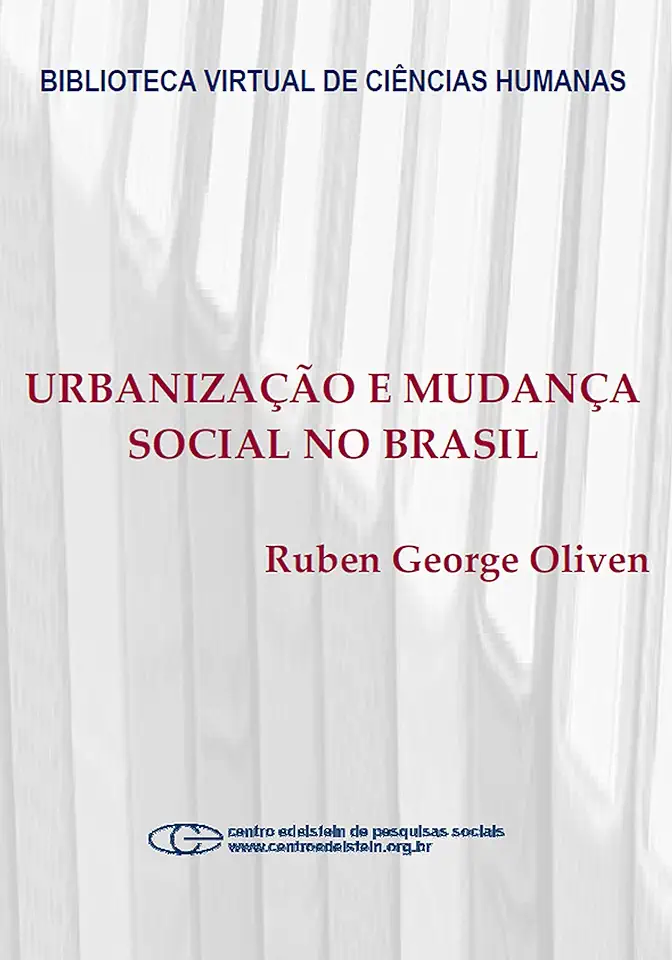
Urbanization and Social Change in Brazil - Ruben George Oliven
Urbanization and Social Change in Brazil: A Comprehensive Analysis by Ruben George Oliven
A Profound Exploration of Brazil's Urban Transformation
In his groundbreaking work, "Urbanization and Social Change in Brazil," Ruben George Oliven delves deep into the intricate relationship between urbanization and social transformation in Brazil. With meticulous research and insightful analysis, Oliven presents a comprehensive understanding of how the country's rapid urbanization has shaped its social fabric, economic dynamics, and cultural landscape.
Key Themes and Insights
1. Urbanization as a Driving Force:
Oliven argues that urbanization has been a central driving force behind Brazil's social and economic development. He examines how the mass migration from rural areas to urban centers has transformed the country's demographic composition, labor force, and patterns of social interaction.
2. Social Inequality and Urban Segregation:
One of the most pressing issues addressed in the book is the stark social inequality and urban segregation that have accompanied Brazil's urbanization. Oliven analyzes the formation of favelas (slums) and gated communities, highlighting the spatial and social divisions that have emerged within Brazilian cities.
3. Urbanization and Economic Development:
Oliven explores the complex relationship between urbanization and economic development in Brazil. He examines how the concentration of economic activities in urban areas has contributed to economic growth while also exacerbating regional disparities and social inequalities.
4. Cultural Transformations and Urban Identity:
The book also delves into the cultural transformations that have accompanied Brazil's urbanization. Oliven discusses the emergence of new urban identities, the blending of traditional and modern cultural practices, and the challenges of preserving cultural heritage in rapidly changing urban environments.
5. Urban Governance and Public Policy:
Oliven critically assesses the role of urban governance and public policy in shaping the trajectory of urbanization in Brazil. He analyzes the successes and shortcomings of various urban planning strategies, housing policies, and social programs aimed at addressing the challenges of urbanization.
Why You Should Read This Book:
"Urbanization and Social Change in Brazil" is an essential read for anyone interested in understanding the complexities of urbanization and its profound impact on societies. Ruben George Oliven's comprehensive analysis provides valuable insights into the challenges and opportunities that Brazil faces as it continues to grapple with the forces of urbanization.
1. A Scholarly Masterpiece:
Oliven's book is a scholarly masterpiece that draws on a wealth of empirical data, historical analysis, and theoretical frameworks. His rigorous research and insightful interpretations make this book a valuable resource for academics, policymakers, and anyone interested in urban studies.
2. A Timely and Relevant Topic:
Urbanization is a global phenomenon that is reshaping societies around the world. Brazil's experience, as one of the most rapidly urbanizing countries, offers valuable lessons for understanding the challenges and opportunities associated with urbanization in the 21st century.
3. A Call to Action:
"Urbanization and Social Change in Brazil" serves as a call to action for policymakers, urban planners, and citizens to address the pressing issues of social inequality, urban segregation, and sustainable development. Oliven's analysis provides a roadmap for creating more inclusive and livable cities that promote social justice and economic prosperity.
Conclusion:
Ruben George Oliven's "Urbanization and Social Change in Brazil" is a must-read for anyone seeking a deeper understanding of the complex relationship between urbanization and social transformation. Its comprehensive analysis, insightful perspectives, and thought-provoking arguments make it an invaluable resource for scholars, policymakers, and anyone interested in the future of cities.